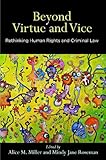Beyond Virtue and Vice : Rethinking Human Rights and Criminal Law / ed. by Mindy Jane Roseman, Alice M. Miller.
Material type: TextSeries: Pennsylvania Studies in Human RightsPublisher: Philadelphia : University of Pennsylvania Press, [2019]Copyright date: ©2019Description: 1 online resource (360 p.) : 1 illusContent type:
TextSeries: Pennsylvania Studies in Human RightsPublisher: Philadelphia : University of Pennsylvania Press, [2019]Copyright date: ©2019Description: 1 online resource (360 p.) : 1 illusContent type: - 9780812295757
- 345 23
- K3240
- online - DeGruyter
| Item type | Current library | Call number | URL | Status | Notes | Barcode | |
|---|---|---|---|---|---|---|---|
 eBook
eBook
|
Biblioteca "Angelicum" Pont. Univ. S.Tommaso d'Aquino Nuvola online | online - DeGruyter (Browse shelf(Opens below)) | Online access | Not for loan (Accesso limitato) | Accesso per gli utenti autorizzati / Access for authorized users | (dgr)9780812295757 |
Frontmatter -- CONTENTS -- Introduction -- PART I. TRANSNATIONAL THEORY AND PRACTICE -- 1. Janet Halley in Conversation with Aziza Ahmed: Interview -- 2. Seismic Shifts: How Prosecution Became the Go- To Tool to Vindicate Rights -- 3. The Harm Principle Meets Morality Offenses: Human Rights, Criminal Law, and the Regulation of Sex and Gender -- 4. Reflections of a Human Rights Activist -- PART II. NATIONAL HISTORICAL PERSPECTIVES -- 5. Virtuous Rights: On Prostitution Exceptionalism in South Korea -- 6. Brazilian Sex Laws: Continuities, Ruptures, and Paradoxes -- 7. The Reach of a Skirt in Southern Africa: Claims to Law and Custom in Protecting and Patrolling Relations of Gender and Sexuality -- 8. Abortion as Treason: Sexuality and Nationalism in France -- PART III. CON TEMPORARY NATIONAL CONCERNS -- 9. Wanja Muguongo in Conversation with Alice M. Miller: Interview -- 10. Criminal Law, Activism, and Sexual and Reproductive Justice: What We Can Learn from the Sex Selection Campaign in India -- 11. Poisoned Gifts: Old Moralities under New Clothes? -- 12. The Filth They Bring: Sex Panics and Racial Others in Lebanon -- 13. Objects in Political Mirrors May Not Be What They Appear -- 14. Harm Production: An Argument for Decriminalization -- NOTES -- CONTRIBUTORS -- INDEX -- ACKNOWLEDGMENTS
restricted access online access with authorization star
http://purl.org/coar/access_right/c_16ec
Over the past two decades, human rights as legal doctrine and practice has shifted its engagement with criminal law from a near exclusive condemnation of it as a source of harm toward increasingly invoking it as a necessary remedy for abuses. These shifts are most visible in the context of sexuality, reproduction, and gender. Criminal law appears in modern states as a tool for societies to define forbidden acts (crimes) and prescribe punishments. It authorizes the state to use force as an aspect of expressing and establishing norms—societal expectations for acceptable behavior which when breached permit individuals to be excluded and stigmatized as unfit for inclusion. But the core principles of human rights oppose exclusion and stigma and embrace the equality and dignity of all. Therefore there is an insuperable tension when human rights actors invoke criminal law to protect and vindicate human rights violations.Beyond Virtue and Vice examines the ways in which recourse to the criminal law features in work by human rights advocates regarding sexuality, gender, and reproduction and presents a framework for considering if, when, and under what conditions, recourse to criminal law is compatible with human rights. Contributors from a wide range of disciplinary fields and geographic locations offer historical and contemporary perspectives, doctrinal cautionary tales, and close readings of advocacy campaigns on the use of criminal law in cases involving abortion and reproductive rights, HIV/AIDS, sex work and prostitution law, human trafficking, sexual violence across genders, child rights and adolescent sexuality, and LGBT issues. The volume offers specific values and approaches of possible use to advocates, activists, policy makers, legislators, scholars, and students in their efforts to craft dialogue and engagement to move beyond state practices that compromise human rights in the name of restraining vice and extolling virtue.Contributors: Aziza Ahmed, Widney Brown, Sealing Cheng, Sonia Corrêa, Joanna N. Erdman, Janet Halley, Alli Jernow, Maria Lucia Karam, Ae-Ryung Kim, Scott Long, Vrinda Marwah, Alice M. Miller, Geetanijali Misra, Rasha Moumneh, Wanja Muguongo, Oliver Phillips, Zain Rizvi, Mindy Jane Roseman, Esteban Restrepo Saldarriaga, Tara Zivkovic.
Mode of access: Internet via World Wide Web.
In English.
Description based on online resource; title from PDF title page (publisher's Web site, viewed 21. Jun 2021)


